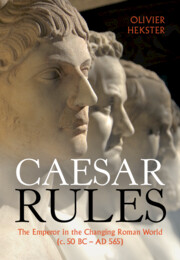Book contents
- Caesar Rules
- Caesar Rules
- Copyright page
- Dedication
- Epigraph
- Contents
- Figures
- Maps
- Graphs
- Preface
- Timeline
- Abbreviations
- Introduction
- 1 Portraying the Roman Emperor
- 2 Playing Imperial Roles
- 3 Being around the Emperor
- 4 The Emperor in the Capital and Provinces
- Conclusions
- Appendix
- Glossary
- Bibliography
- Index of Persons and Places
- General Index
Conclusions
Emperors in a Changing World
Published online by Cambridge University Press: 23 November 2022
- Caesar Rules
- Caesar Rules
- Copyright page
- Dedication
- Epigraph
- Contents
- Figures
- Maps
- Graphs
- Preface
- Timeline
- Abbreviations
- Introduction
- 1 Portraying the Roman Emperor
- 2 Playing Imperial Roles
- 3 Being around the Emperor
- 4 The Emperor in the Capital and Provinces
- Conclusions
- Appendix
- Glossary
- Bibliography
- Index of Persons and Places
- General Index
Summary
The Roman emperor did not exist. Of course, for most of the time from about 50 BC to 1453 there was a man in Rome, and later Constantinople, who for all intents and purposes ruled the empire and was named Augustus. But the expectations of what that man should be and do differed wildly. Various people in various contexts at various times knew exactly what to expect of their emperor. Yet these people did not necessarily agree with one another. That there were such different expectations mattered. It influenced the way in which emperors were depicted and described, the way in which they were remembered, the people with whom they were surrounded, and even how they acted. Context created emperorship. Different groups and individuals tried to understand and formulate the supreme position of the Roman emperor, and then adapt these formulations to changing contexts. They had to, as emperorship as such was never decidedly defined.
- Type
- Chapter
- Information
- Caesar RulesThe Emperor in the Changing Roman World (c. 50 BC – AD 565), pp. 326 - 333Publisher: Cambridge University PressPrint publication year: 2022

